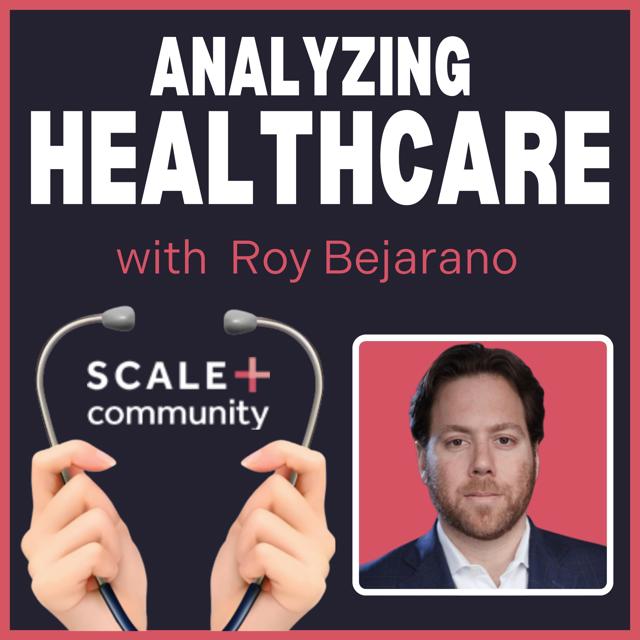
Om Analyzing Healthcare
What’s next for healthcare? In a rapidly evolving industry, staying ahead requires insights, expert analysis, and actionable strategies. Analyzing Healthcare is the podcast for healthcare professionals, policymakers, investors, and curious citizens who want to navigate the challenges and opportunities shaping the future of healthcare. Analyzing Healthcare goes beyond theory to deliver real-world case studies and perspectives on the U.S. and global healthcare system. Hosted by industry experts Roy Bejarano and Jason Schifman, Co-Founders of SCALE Healthcare, the country’s leading healthcare services consulting firm, the podcast explores the ever changing world of our healthcare industry. Whether you’re eager to ignite new ideas, broaden your knowledge, or enjoy stimulating discussions, Analyzing Healthcare offers something for everyone. Each episode features thought-provoking conversations with healthcare political leaders, CEOs and innovators, to authors and visionaries, tackling today’s most pressing topics, including a macro understanding of how to evaluate our health system on a global basis, digital health advancements, artificial intelligence in healthcare, value-based care models, telemedicine trends, healthcare policy and regulatory changes. Learn how top professionals are improving patient outcomes, streamlining operations, and driving innovation in this dynamic field. Whether you’re focused on healthcare management, investing in healthcare services, or simply passionate about staying informed, this podcast empowers you with the tools and knowledge to succeed. Join us as we explore the subjects that influence all of our lives and encourage you to join the dialogue. Stay ahead of the curve—subscribe to Analyzing Healthcare with Roy Bejarano and Jason Schifman and explore the groundbreaking trends and strategies defining the future of healthcare. Head on over to www.scale-community.com to become a Scale Community Member. Join us next time, where stories, insights, and inspiration await. About the Hosts Roy Bejarano is the Co-Founder and CEO of SCALE Healthcare, named the #1 Fastest Growing Consulting Firm in the U.S. by Consulting Magazine in 2022. Since founding the company in 2019, Roy’s team has collaborated with hundreds of multi-site provider organizations and financial institutions, focusing on MSO operations, practice management, and strategic healthcare dynamics. Previously, Roy co-founded Frontier Healthcare, New York’s largest ASC management company at the time of its sale to Physicians Endoscopy/Kelso Private Equity. He also served as Chief Strategy Officer & Co-President of Physicians Endoscopy’s MSO initiative, leading its inaugural physician practice MSO partnership. Before entering healthcare, Roy gained over a decade of experience in investment banking, private equity, and strategic consulting with firms like Houlihan Lokey and Citigroup. A frequent author and speaker on healthcare trends, Roy has contributed to Fast Company, Physicians Practice, and Beckers and presented at leading industry conferences. Jason Schifman is the Co-Founder & President of SCALE Healthcare. SCALE provides both the broadest and deepest range of services & solutions available to multi-site healthcare management teams today, based on our fundamental belief that narrow, and/or purely theoretical solutions cannot solve for the multidisciplinary opportunities and challenges of today’s healthcare market. Jason is a trusted advisor to an extensive range of multisite healthcare organizations, Boards, CEOs, private equity investors and lenders across the healthcare market. He has advised stakeholders on a broad range of strategic, growth & development and operational objectives. Internally, Jason is focused on overseeing SCALE’s management leadership team, as well as leading the development and expansion of SCALE’s portfolio of services and innovation initiatives.
📻 Siste episoder av Analyzing Healthcare
Her er de nyeste episodene tilgjengelige via RSS-feeden:
📱 Slik abonnerer du på Analyzing Healthcare
Apple Podcasts (iOS/Mac):
- 1. Åpne Apple Podcasts-appen
- 2. Trykk på "Bibliotek" nederst
- 3. Trykk på "..." øverst til høyre
- 4. Velg "Legg til en podcast via URL"
- 5. Lim inn RSS-linken fra boksen over
Andre podcastapper:
- 1. Åpne din podcastapp
- 2. Look for "Add by URL" eller "RSS"
- 3. Lim inn RSS-linken
- 4. Søk eller trykk "Subscribe"
- 5. Episodene vil nå vises i appen din